Literature Review on Diabetes and Medical Nutrition Therapy
VerifiedAdded on 2023/01/07
|11
|3801
|71
Literature Review
AI Summary
This literature review examines diabetes mellitus, a prevalent metabolic disorder characterized by high blood sugar levels. It explores the rising influence of diabetes, particularly in middle-income nations, highlighting the need for intervention. The review covers the rationale for studying diabetes, its causes including genetics, lifestyle, and complications. It also discusses the research question formulated using the PICO framework, focusing on the effectiveness of medical nutrition therapy provided by dietitians in managing non-insulin-dependent diabetes mellitus. The search strategy employed, utilizing databases like Science Direct and keywords, is detailed. The review emphasizes the importance of medical nutrition therapy, highlighting its effectiveness in improving glycemic control and metabolic outcomes, based on the findings of relevant studies and guidelines. This document provides a comprehensive overview of the topic, incorporating the key elements of a literature review, including introduction, rationale, research question, search strategy, main findings, and recommendations.
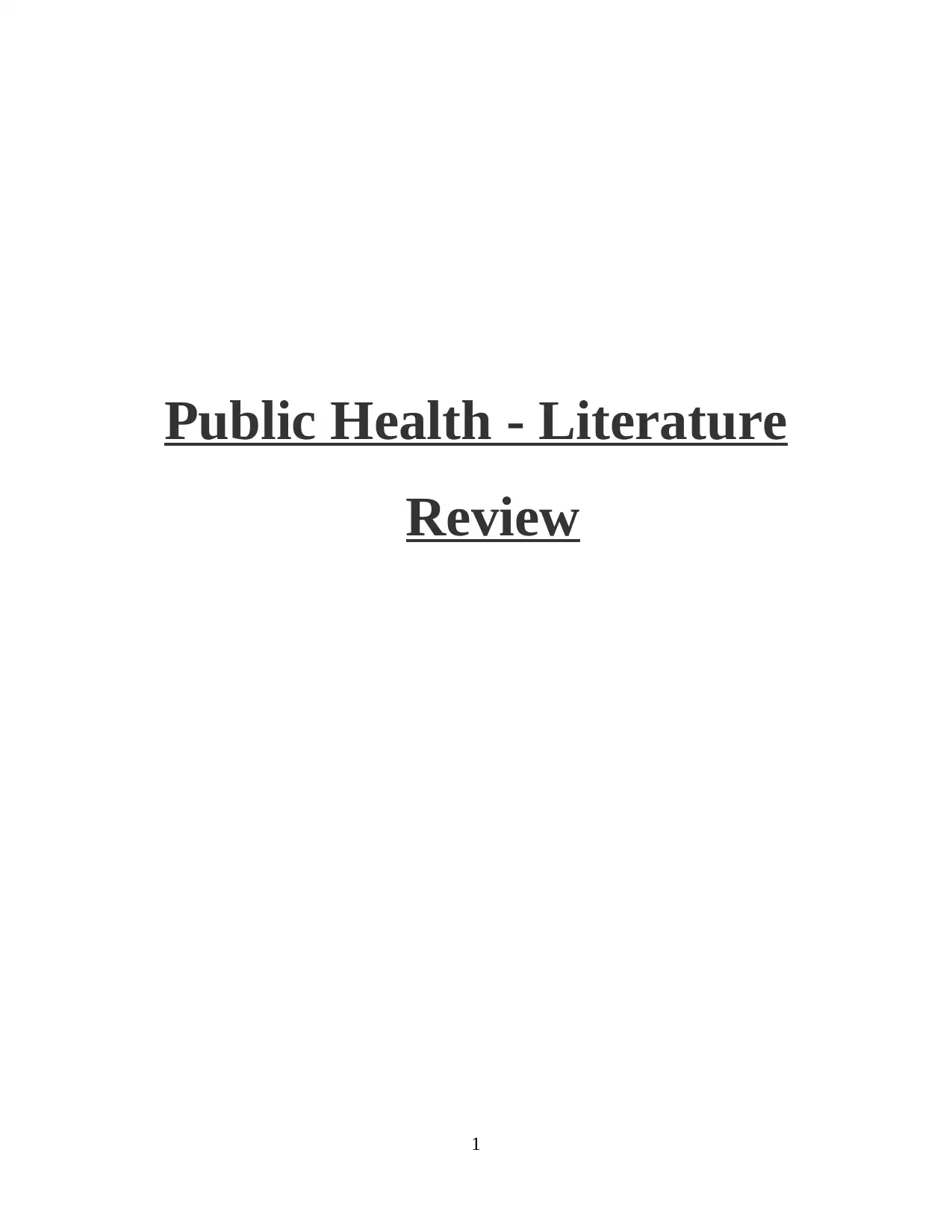
Public Health - Literature
Review
1
Review
1
Paraphrase This Document
Need a fresh take? Get an instant paraphrase of this document with our AI Paraphraser
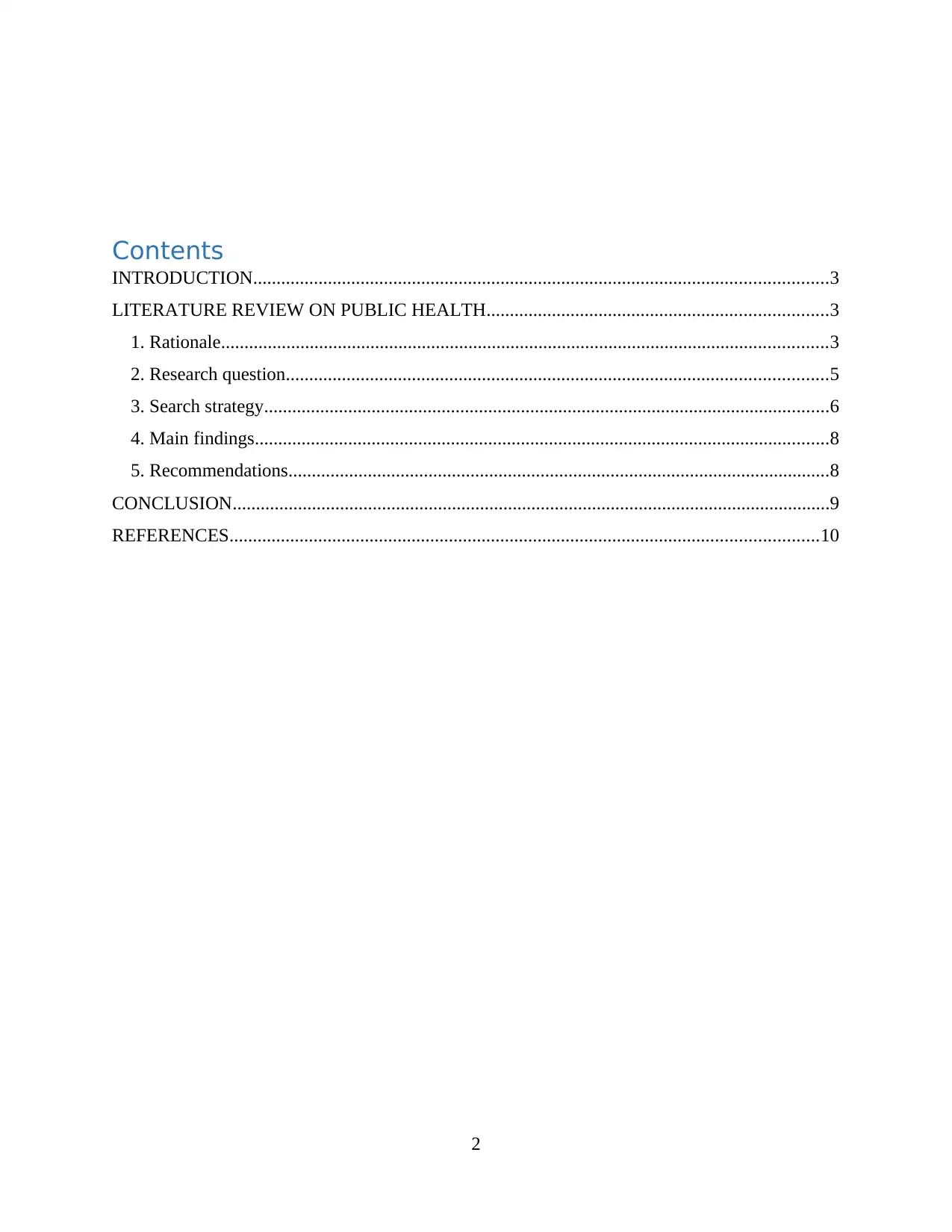
Contents
INTRODUCTION...........................................................................................................................3
LITERATURE REVIEW ON PUBLIC HEALTH.........................................................................3
1. Rationale..................................................................................................................................3
2. Research question....................................................................................................................5
3. Search strategy.........................................................................................................................6
4. Main findings...........................................................................................................................8
5. Recommendations....................................................................................................................8
CONCLUSION................................................................................................................................9
REFERENCES..............................................................................................................................10
2
INTRODUCTION...........................................................................................................................3
LITERATURE REVIEW ON PUBLIC HEALTH.........................................................................3
1. Rationale..................................................................................................................................3
2. Research question....................................................................................................................5
3. Search strategy.........................................................................................................................6
4. Main findings...........................................................................................................................8
5. Recommendations....................................................................................................................8
CONCLUSION................................................................................................................................9
REFERENCES..............................................................................................................................10
2
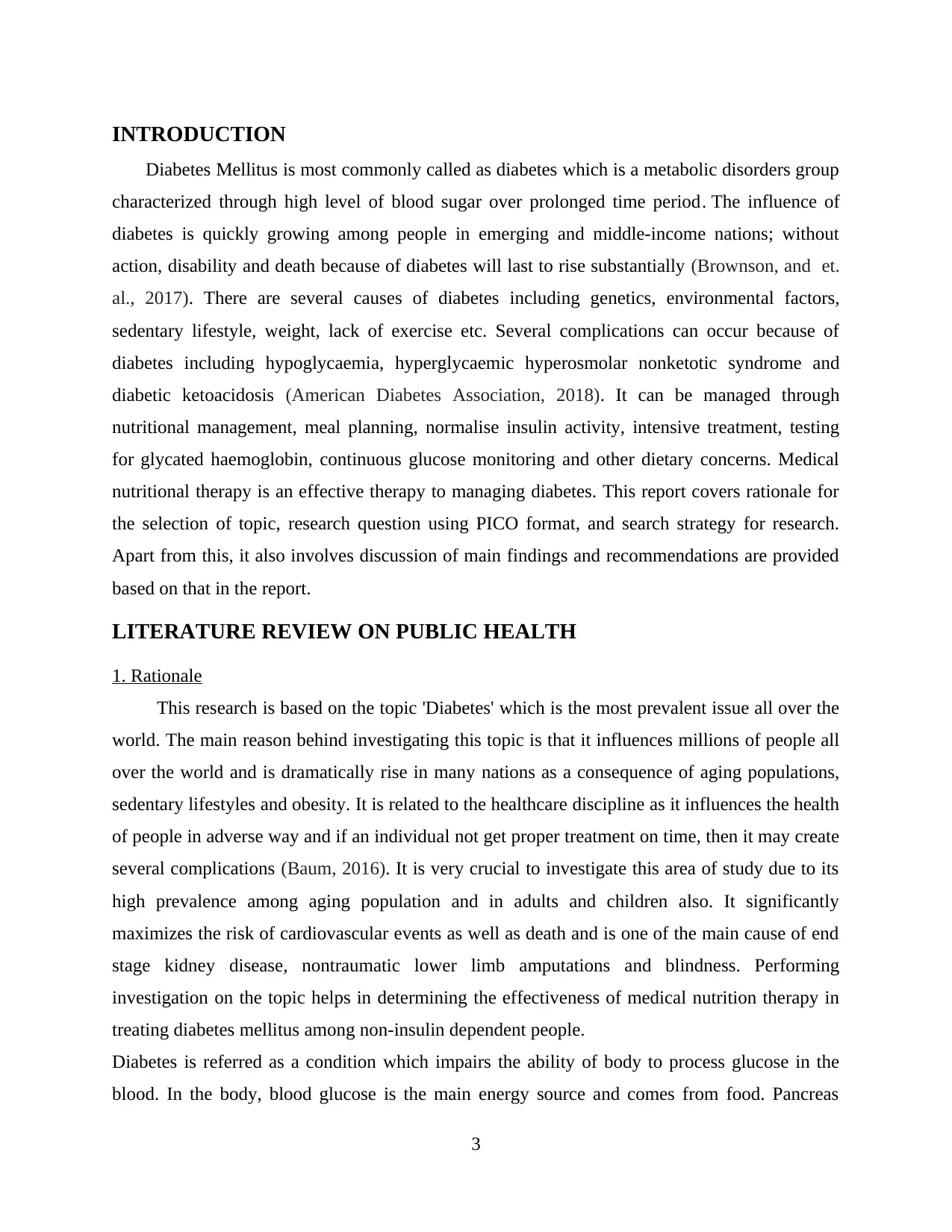
INTRODUCTION
Diabetes Mellitus is most commonly called as diabetes which is a metabolic disorders group
characterized through high level of blood sugar over prolonged time period. The influence of
diabetes is quickly growing among people in emerging and middle-income nations; without
action, disability and death because of diabetes will last to rise substantially (Brownson, and et.
al., 2017). There are several causes of diabetes including genetics, environmental factors,
sedentary lifestyle, weight, lack of exercise etc. Several complications can occur because of
diabetes including hypoglycaemia, hyperglycaemic hyperosmolar nonketotic syndrome and
diabetic ketoacidosis (American Diabetes Association, 2018). It can be managed through
nutritional management, meal planning, normalise insulin activity, intensive treatment, testing
for glycated haemoglobin, continuous glucose monitoring and other dietary concerns. Medical
nutritional therapy is an effective therapy to managing diabetes. This report covers rationale for
the selection of topic, research question using PICO format, and search strategy for research.
Apart from this, it also involves discussion of main findings and recommendations are provided
based on that in the report.
LITERATURE REVIEW ON PUBLIC HEALTH
1. Rationale
This research is based on the topic 'Diabetes' which is the most prevalent issue all over the
world. The main reason behind investigating this topic is that it influences millions of people all
over the world and is dramatically rise in many nations as a consequence of aging populations,
sedentary lifestyles and obesity. It is related to the healthcare discipline as it influences the health
of people in adverse way and if an individual not get proper treatment on time, then it may create
several complications (Baum, 2016). It is very crucial to investigate this area of study due to its
high prevalence among aging population and in adults and children also. It significantly
maximizes the risk of cardiovascular events as well as death and is one of the main cause of end
stage kidney disease, nontraumatic lower limb amputations and blindness. Performing
investigation on the topic helps in determining the effectiveness of medical nutrition therapy in
treating diabetes mellitus among non-insulin dependent people.
Diabetes is referred as a condition which impairs the ability of body to process glucose in the
blood. In the body, blood glucose is the main energy source and comes from food. Pancreas
3
Diabetes Mellitus is most commonly called as diabetes which is a metabolic disorders group
characterized through high level of blood sugar over prolonged time period. The influence of
diabetes is quickly growing among people in emerging and middle-income nations; without
action, disability and death because of diabetes will last to rise substantially (Brownson, and et.
al., 2017). There are several causes of diabetes including genetics, environmental factors,
sedentary lifestyle, weight, lack of exercise etc. Several complications can occur because of
diabetes including hypoglycaemia, hyperglycaemic hyperosmolar nonketotic syndrome and
diabetic ketoacidosis (American Diabetes Association, 2018). It can be managed through
nutritional management, meal planning, normalise insulin activity, intensive treatment, testing
for glycated haemoglobin, continuous glucose monitoring and other dietary concerns. Medical
nutritional therapy is an effective therapy to managing diabetes. This report covers rationale for
the selection of topic, research question using PICO format, and search strategy for research.
Apart from this, it also involves discussion of main findings and recommendations are provided
based on that in the report.
LITERATURE REVIEW ON PUBLIC HEALTH
1. Rationale
This research is based on the topic 'Diabetes' which is the most prevalent issue all over the
world. The main reason behind investigating this topic is that it influences millions of people all
over the world and is dramatically rise in many nations as a consequence of aging populations,
sedentary lifestyles and obesity. It is related to the healthcare discipline as it influences the health
of people in adverse way and if an individual not get proper treatment on time, then it may create
several complications (Baum, 2016). It is very crucial to investigate this area of study due to its
high prevalence among aging population and in adults and children also. It significantly
maximizes the risk of cardiovascular events as well as death and is one of the main cause of end
stage kidney disease, nontraumatic lower limb amputations and blindness. Performing
investigation on the topic helps in determining the effectiveness of medical nutrition therapy in
treating diabetes mellitus among non-insulin dependent people.
Diabetes is referred as a condition which impairs the ability of body to process glucose in the
blood. In the body, blood glucose is the main energy source and comes from food. Pancreas
3
⊘ This is a preview!⊘
Do you want full access?
Subscribe today to unlock all pages.

Trusted by 1+ million students worldwide
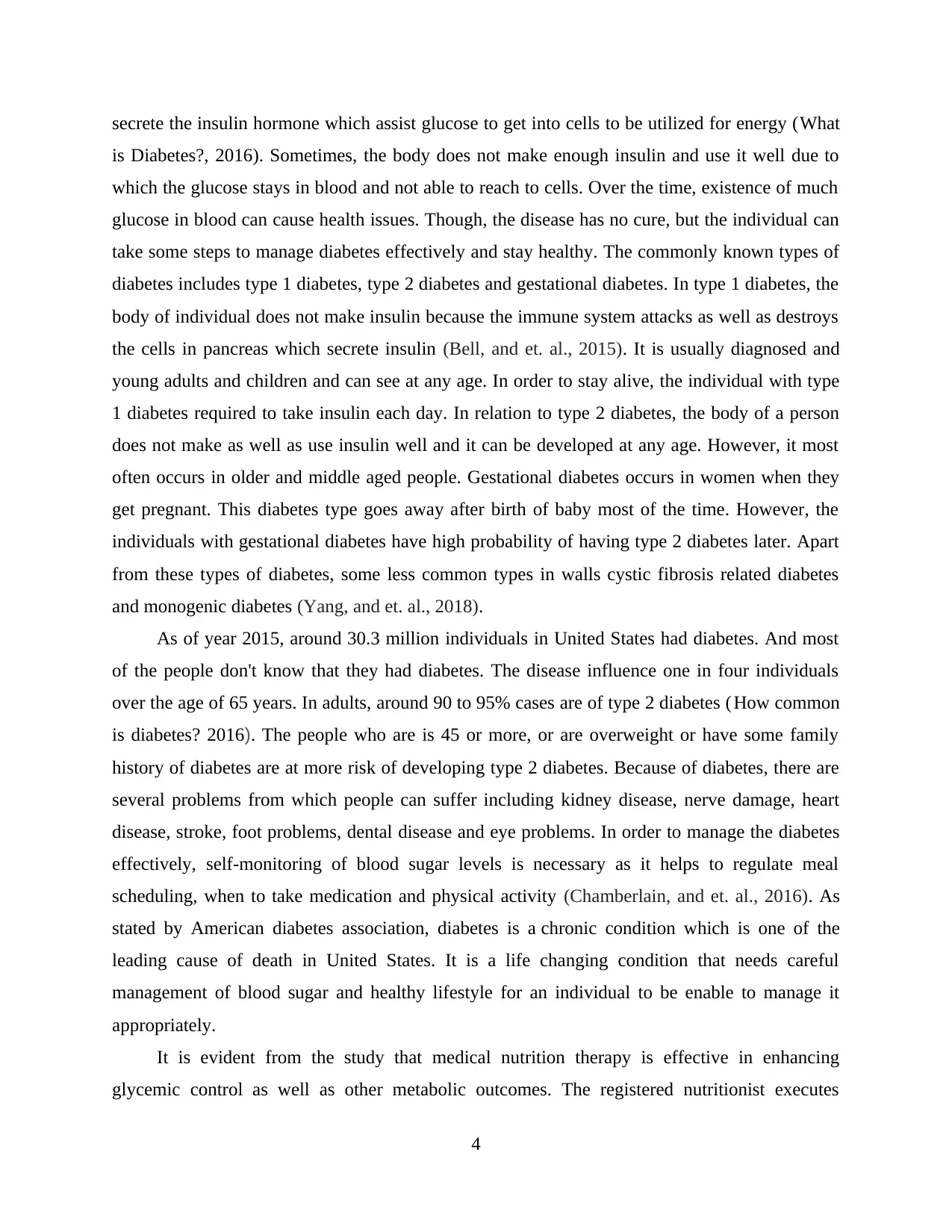
secrete the insulin hormone which assist glucose to get into cells to be utilized for energy (What
is Diabetes?, 2016). Sometimes, the body does not make enough insulin and use it well due to
which the glucose stays in blood and not able to reach to cells. Over the time, existence of much
glucose in blood can cause health issues. Though, the disease has no cure, but the individual can
take some steps to manage diabetes effectively and stay healthy. The commonly known types of
diabetes includes type 1 diabetes, type 2 diabetes and gestational diabetes. In type 1 diabetes, the
body of individual does not make insulin because the immune system attacks as well as destroys
the cells in pancreas which secrete insulin (Bell, and et. al., 2015). It is usually diagnosed and
young adults and children and can see at any age. In order to stay alive, the individual with type
1 diabetes required to take insulin each day. In relation to type 2 diabetes, the body of a person
does not make as well as use insulin well and it can be developed at any age. However, it most
often occurs in older and middle aged people. Gestational diabetes occurs in women when they
get pregnant. This diabetes type goes away after birth of baby most of the time. However, the
individuals with gestational diabetes have high probability of having type 2 diabetes later. Apart
from these types of diabetes, some less common types in walls cystic fibrosis related diabetes
and monogenic diabetes (Yang, and et. al., 2018).
As of year 2015, around 30.3 million individuals in United States had diabetes. And most
of the people don't know that they had diabetes. The disease influence one in four individuals
over the age of 65 years. In adults, around 90 to 95% cases are of type 2 diabetes (How common
is diabetes? 2016). The people who are is 45 or more, or are overweight or have some family
history of diabetes are at more risk of developing type 2 diabetes. Because of diabetes, there are
several problems from which people can suffer including kidney disease, nerve damage, heart
disease, stroke, foot problems, dental disease and eye problems. In order to manage the diabetes
effectively, self-monitoring of blood sugar levels is necessary as it helps to regulate meal
scheduling, when to take medication and physical activity (Chamberlain, and et. al., 2016). As
stated by American diabetes association, diabetes is a chronic condition which is one of the
leading cause of death in United States. It is a life changing condition that needs careful
management of blood sugar and healthy lifestyle for an individual to be enable to manage it
appropriately.
It is evident from the study that medical nutrition therapy is effective in enhancing
glycemic control as well as other metabolic outcomes. The registered nutritionist executes
4
is Diabetes?, 2016). Sometimes, the body does not make enough insulin and use it well due to
which the glucose stays in blood and not able to reach to cells. Over the time, existence of much
glucose in blood can cause health issues. Though, the disease has no cure, but the individual can
take some steps to manage diabetes effectively and stay healthy. The commonly known types of
diabetes includes type 1 diabetes, type 2 diabetes and gestational diabetes. In type 1 diabetes, the
body of individual does not make insulin because the immune system attacks as well as destroys
the cells in pancreas which secrete insulin (Bell, and et. al., 2015). It is usually diagnosed and
young adults and children and can see at any age. In order to stay alive, the individual with type
1 diabetes required to take insulin each day. In relation to type 2 diabetes, the body of a person
does not make as well as use insulin well and it can be developed at any age. However, it most
often occurs in older and middle aged people. Gestational diabetes occurs in women when they
get pregnant. This diabetes type goes away after birth of baby most of the time. However, the
individuals with gestational diabetes have high probability of having type 2 diabetes later. Apart
from these types of diabetes, some less common types in walls cystic fibrosis related diabetes
and monogenic diabetes (Yang, and et. al., 2018).
As of year 2015, around 30.3 million individuals in United States had diabetes. And most
of the people don't know that they had diabetes. The disease influence one in four individuals
over the age of 65 years. In adults, around 90 to 95% cases are of type 2 diabetes (How common
is diabetes? 2016). The people who are is 45 or more, or are overweight or have some family
history of diabetes are at more risk of developing type 2 diabetes. Because of diabetes, there are
several problems from which people can suffer including kidney disease, nerve damage, heart
disease, stroke, foot problems, dental disease and eye problems. In order to manage the diabetes
effectively, self-monitoring of blood sugar levels is necessary as it helps to regulate meal
scheduling, when to take medication and physical activity (Chamberlain, and et. al., 2016). As
stated by American diabetes association, diabetes is a chronic condition which is one of the
leading cause of death in United States. It is a life changing condition that needs careful
management of blood sugar and healthy lifestyle for an individual to be enable to manage it
appropriately.
It is evident from the study that medical nutrition therapy is effective in enhancing
glycemic control as well as other metabolic outcomes. The registered nutritionist executes
4
Paraphrase This Document
Need a fresh take? Get an instant paraphrase of this document with our AI Paraphraser
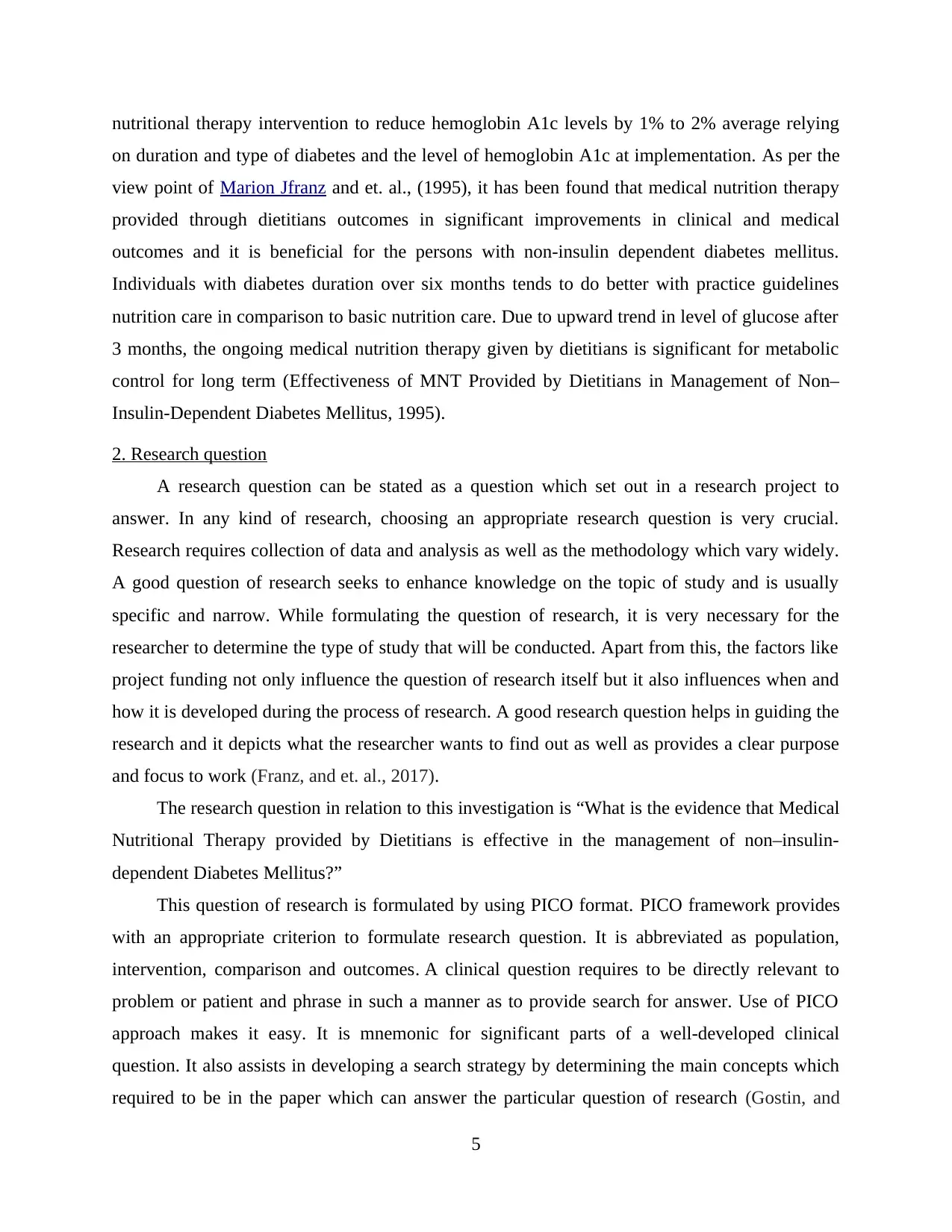
nutritional therapy intervention to reduce hemoglobin A1c levels by 1% to 2% average relying
on duration and type of diabetes and the level of hemoglobin A1c at implementation. As per the
view point of Marion Jfranz and et. al., (1995), it has been found that medical nutrition therapy
provided through dietitians outcomes in significant improvements in clinical and medical
outcomes and it is beneficial for the persons with non-insulin dependent diabetes mellitus.
Individuals with diabetes duration over six months tends to do better with practice guidelines
nutrition care in comparison to basic nutrition care. Due to upward trend in level of glucose after
3 months, the ongoing medical nutrition therapy given by dietitians is significant for metabolic
control for long term (Effectiveness of MNT Provided by Dietitians in Management of Non–
Insulin-Dependent Diabetes Mellitus, 1995).
2. Research question
A research question can be stated as a question which set out in a research project to
answer. In any kind of research, choosing an appropriate research question is very crucial.
Research requires collection of data and analysis as well as the methodology which vary widely.
A good question of research seeks to enhance knowledge on the topic of study and is usually
specific and narrow. While formulating the question of research, it is very necessary for the
researcher to determine the type of study that will be conducted. Apart from this, the factors like
project funding not only influence the question of research itself but it also influences when and
how it is developed during the process of research. A good research question helps in guiding the
research and it depicts what the researcher wants to find out as well as provides a clear purpose
and focus to work (Franz, and et. al., 2017).
The research question in relation to this investigation is “What is the evidence that Medical
Nutritional Therapy provided by Dietitians is effective in the management of non–insulin-
dependent Diabetes Mellitus?”
This question of research is formulated by using PICO format. PICO framework provides
with an appropriate criterion to formulate research question. It is abbreviated as population,
intervention, comparison and outcomes. A clinical question requires to be directly relevant to
problem or patient and phrase in such a manner as to provide search for answer. Use of PICO
approach makes it easy. It is mnemonic for significant parts of a well-developed clinical
question. It also assists in developing a search strategy by determining the main concepts which
required to be in the paper which can answer the particular question of research (Gostin, and
5
on duration and type of diabetes and the level of hemoglobin A1c at implementation. As per the
view point of Marion Jfranz and et. al., (1995), it has been found that medical nutrition therapy
provided through dietitians outcomes in significant improvements in clinical and medical
outcomes and it is beneficial for the persons with non-insulin dependent diabetes mellitus.
Individuals with diabetes duration over six months tends to do better with practice guidelines
nutrition care in comparison to basic nutrition care. Due to upward trend in level of glucose after
3 months, the ongoing medical nutrition therapy given by dietitians is significant for metabolic
control for long term (Effectiveness of MNT Provided by Dietitians in Management of Non–
Insulin-Dependent Diabetes Mellitus, 1995).
2. Research question
A research question can be stated as a question which set out in a research project to
answer. In any kind of research, choosing an appropriate research question is very crucial.
Research requires collection of data and analysis as well as the methodology which vary widely.
A good question of research seeks to enhance knowledge on the topic of study and is usually
specific and narrow. While formulating the question of research, it is very necessary for the
researcher to determine the type of study that will be conducted. Apart from this, the factors like
project funding not only influence the question of research itself but it also influences when and
how it is developed during the process of research. A good research question helps in guiding the
research and it depicts what the researcher wants to find out as well as provides a clear purpose
and focus to work (Franz, and et. al., 2017).
The research question in relation to this investigation is “What is the evidence that Medical
Nutritional Therapy provided by Dietitians is effective in the management of non–insulin-
dependent Diabetes Mellitus?”
This question of research is formulated by using PICO format. PICO framework provides
with an appropriate criterion to formulate research question. It is abbreviated as population,
intervention, comparison and outcomes. A clinical question requires to be directly relevant to
problem or patient and phrase in such a manner as to provide search for answer. Use of PICO
approach makes it easy. It is mnemonic for significant parts of a well-developed clinical
question. It also assists in developing a search strategy by determining the main concepts which
required to be in the paper which can answer the particular question of research (Gostin, and
5
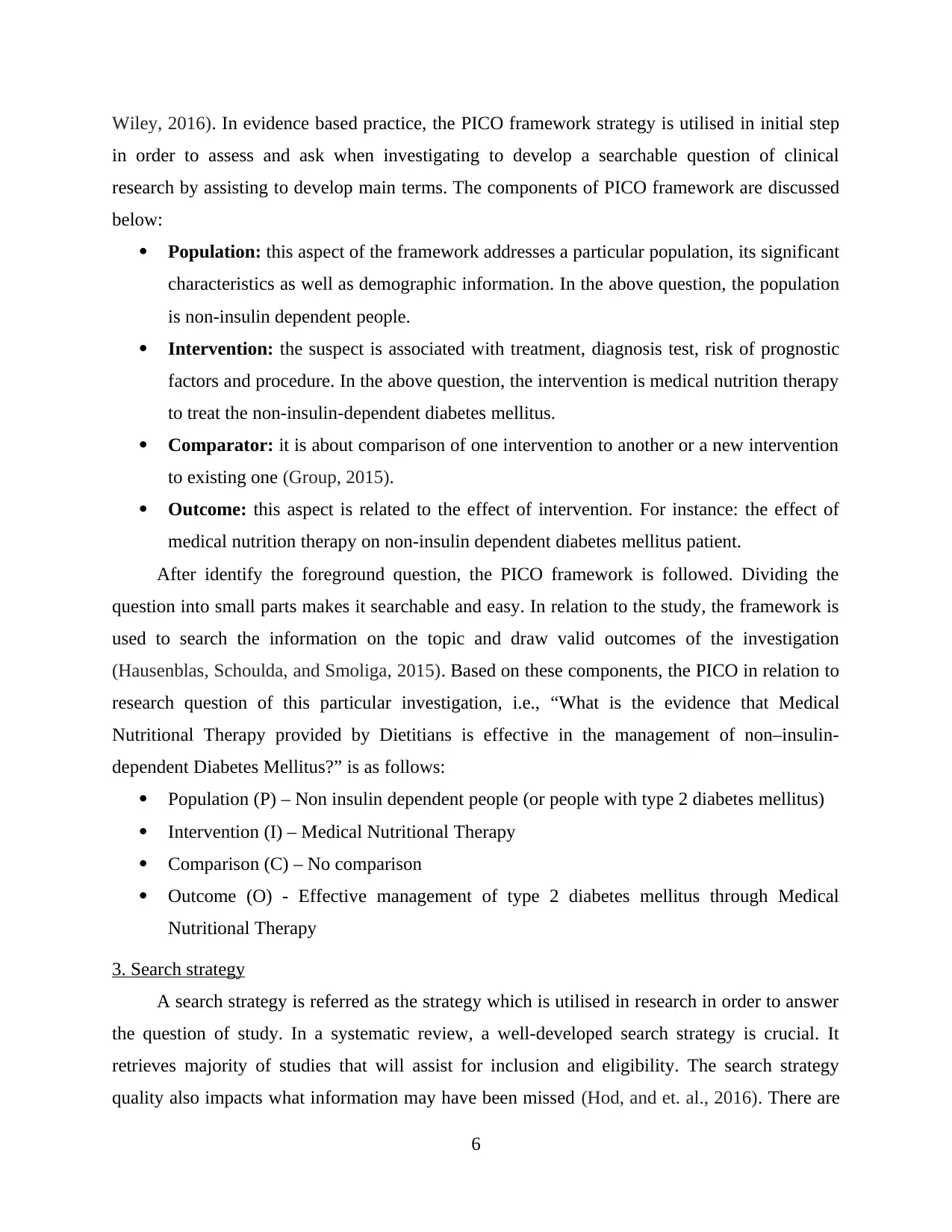
Wiley, 2016). In evidence based practice, the PICO framework strategy is utilised in initial step
in order to assess and ask when investigating to develop a searchable question of clinical
research by assisting to develop main terms. The components of PICO framework are discussed
below:
Population: this aspect of the framework addresses a particular population, its significant
characteristics as well as demographic information. In the above question, the population
is non-insulin dependent people.
Intervention: the suspect is associated with treatment, diagnosis test, risk of prognostic
factors and procedure. In the above question, the intervention is medical nutrition therapy
to treat the non-insulin-dependent diabetes mellitus.
Comparator: it is about comparison of one intervention to another or a new intervention
to existing one (Group, 2015).
Outcome: this aspect is related to the effect of intervention. For instance: the effect of
medical nutrition therapy on non-insulin dependent diabetes mellitus patient.
After identify the foreground question, the PICO framework is followed. Dividing the
question into small parts makes it searchable and easy. In relation to the study, the framework is
used to search the information on the topic and draw valid outcomes of the investigation
(Hausenblas, Schoulda, and Smoliga, 2015). Based on these components, the PICO in relation to
research question of this particular investigation, i.e., “What is the evidence that Medical
Nutritional Therapy provided by Dietitians is effective in the management of non–insulin-
dependent Diabetes Mellitus?” is as follows:
Population (P) – Non insulin dependent people (or people with type 2 diabetes mellitus)
Intervention (I) – Medical Nutritional Therapy
Comparison (C) – No comparison
Outcome (O) - Effective management of type 2 diabetes mellitus through Medical
Nutritional Therapy
3. Search strategy
A search strategy is referred as the strategy which is utilised in research in order to answer
the question of study. In a systematic review, a well-developed search strategy is crucial. It
retrieves majority of studies that will assist for inclusion and eligibility. The search strategy
quality also impacts what information may have been missed (Hod, and et. al., 2016). There are
6
in order to assess and ask when investigating to develop a searchable question of clinical
research by assisting to develop main terms. The components of PICO framework are discussed
below:
Population: this aspect of the framework addresses a particular population, its significant
characteristics as well as demographic information. In the above question, the population
is non-insulin dependent people.
Intervention: the suspect is associated with treatment, diagnosis test, risk of prognostic
factors and procedure. In the above question, the intervention is medical nutrition therapy
to treat the non-insulin-dependent diabetes mellitus.
Comparator: it is about comparison of one intervention to another or a new intervention
to existing one (Group, 2015).
Outcome: this aspect is related to the effect of intervention. For instance: the effect of
medical nutrition therapy on non-insulin dependent diabetes mellitus patient.
After identify the foreground question, the PICO framework is followed. Dividing the
question into small parts makes it searchable and easy. In relation to the study, the framework is
used to search the information on the topic and draw valid outcomes of the investigation
(Hausenblas, Schoulda, and Smoliga, 2015). Based on these components, the PICO in relation to
research question of this particular investigation, i.e., “What is the evidence that Medical
Nutritional Therapy provided by Dietitians is effective in the management of non–insulin-
dependent Diabetes Mellitus?” is as follows:
Population (P) – Non insulin dependent people (or people with type 2 diabetes mellitus)
Intervention (I) – Medical Nutritional Therapy
Comparison (C) – No comparison
Outcome (O) - Effective management of type 2 diabetes mellitus through Medical
Nutritional Therapy
3. Search strategy
A search strategy is referred as the strategy which is utilised in research in order to answer
the question of study. In a systematic review, a well-developed search strategy is crucial. It
retrieves majority of studies that will assist for inclusion and eligibility. The search strategy
quality also impacts what information may have been missed (Hod, and et. al., 2016). There are
6
⊘ This is a preview!⊘
Do you want full access?
Subscribe today to unlock all pages.

Trusted by 1+ million students worldwide
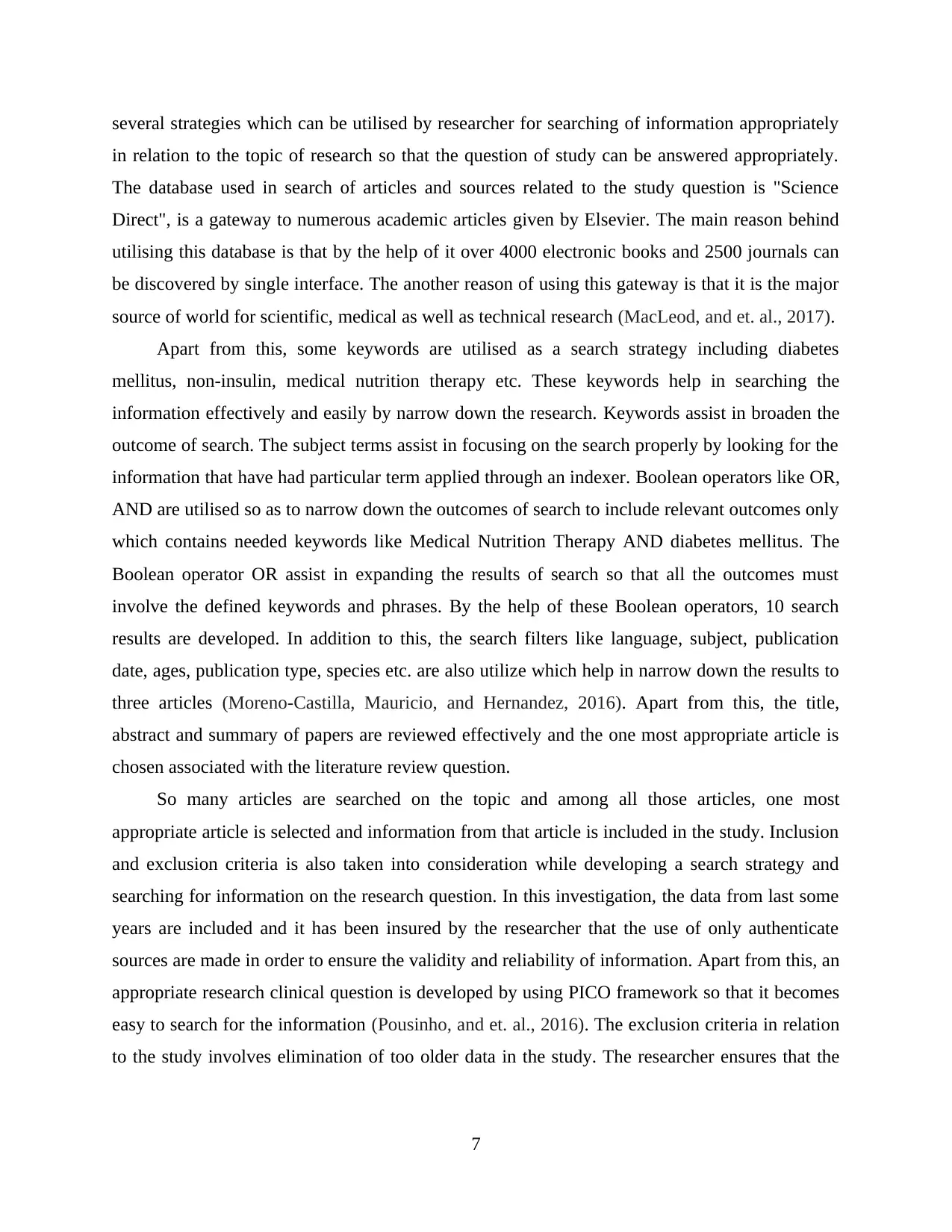
several strategies which can be utilised by researcher for searching of information appropriately
in relation to the topic of research so that the question of study can be answered appropriately.
The database used in search of articles and sources related to the study question is "Science
Direct", is a gateway to numerous academic articles given by Elsevier. The main reason behind
utilising this database is that by the help of it over 4000 electronic books and 2500 journals can
be discovered by single interface. The another reason of using this gateway is that it is the major
source of world for scientific, medical as well as technical research (MacLeod, and et. al., 2017).
Apart from this, some keywords are utilised as a search strategy including diabetes
mellitus, non-insulin, medical nutrition therapy etc. These keywords help in searching the
information effectively and easily by narrow down the research. Keywords assist in broaden the
outcome of search. The subject terms assist in focusing on the search properly by looking for the
information that have had particular term applied through an indexer. Boolean operators like OR,
AND are utilised so as to narrow down the outcomes of search to include relevant outcomes only
which contains needed keywords like Medical Nutrition Therapy AND diabetes mellitus. The
Boolean operator OR assist in expanding the results of search so that all the outcomes must
involve the defined keywords and phrases. By the help of these Boolean operators, 10 search
results are developed. In addition to this, the search filters like language, subject, publication
date, ages, publication type, species etc. are also utilize which help in narrow down the results to
three articles (Moreno-Castilla, Mauricio, and Hernandez, 2016). Apart from this, the title,
abstract and summary of papers are reviewed effectively and the one most appropriate article is
chosen associated with the literature review question.
So many articles are searched on the topic and among all those articles, one most
appropriate article is selected and information from that article is included in the study. Inclusion
and exclusion criteria is also taken into consideration while developing a search strategy and
searching for information on the research question. In this investigation, the data from last some
years are included and it has been insured by the researcher that the use of only authenticate
sources are made in order to ensure the validity and reliability of information. Apart from this, an
appropriate research clinical question is developed by using PICO framework so that it becomes
easy to search for the information (Pousinho, and et. al., 2016). The exclusion criteria in relation
to the study involves elimination of too older data in the study. The researcher ensures that the
7
in relation to the topic of research so that the question of study can be answered appropriately.
The database used in search of articles and sources related to the study question is "Science
Direct", is a gateway to numerous academic articles given by Elsevier. The main reason behind
utilising this database is that by the help of it over 4000 electronic books and 2500 journals can
be discovered by single interface. The another reason of using this gateway is that it is the major
source of world for scientific, medical as well as technical research (MacLeod, and et. al., 2017).
Apart from this, some keywords are utilised as a search strategy including diabetes
mellitus, non-insulin, medical nutrition therapy etc. These keywords help in searching the
information effectively and easily by narrow down the research. Keywords assist in broaden the
outcome of search. The subject terms assist in focusing on the search properly by looking for the
information that have had particular term applied through an indexer. Boolean operators like OR,
AND are utilised so as to narrow down the outcomes of search to include relevant outcomes only
which contains needed keywords like Medical Nutrition Therapy AND diabetes mellitus. The
Boolean operator OR assist in expanding the results of search so that all the outcomes must
involve the defined keywords and phrases. By the help of these Boolean operators, 10 search
results are developed. In addition to this, the search filters like language, subject, publication
date, ages, publication type, species etc. are also utilize which help in narrow down the results to
three articles (Moreno-Castilla, Mauricio, and Hernandez, 2016). Apart from this, the title,
abstract and summary of papers are reviewed effectively and the one most appropriate article is
chosen associated with the literature review question.
So many articles are searched on the topic and among all those articles, one most
appropriate article is selected and information from that article is included in the study. Inclusion
and exclusion criteria is also taken into consideration while developing a search strategy and
searching for information on the research question. In this investigation, the data from last some
years are included and it has been insured by the researcher that the use of only authenticate
sources are made in order to ensure the validity and reliability of information. Apart from this, an
appropriate research clinical question is developed by using PICO framework so that it becomes
easy to search for the information (Pousinho, and et. al., 2016). The exclusion criteria in relation
to the study involves elimination of too older data in the study. The researcher ensures that the
7
Paraphrase This Document
Need a fresh take? Get an instant paraphrase of this document with our AI Paraphraser
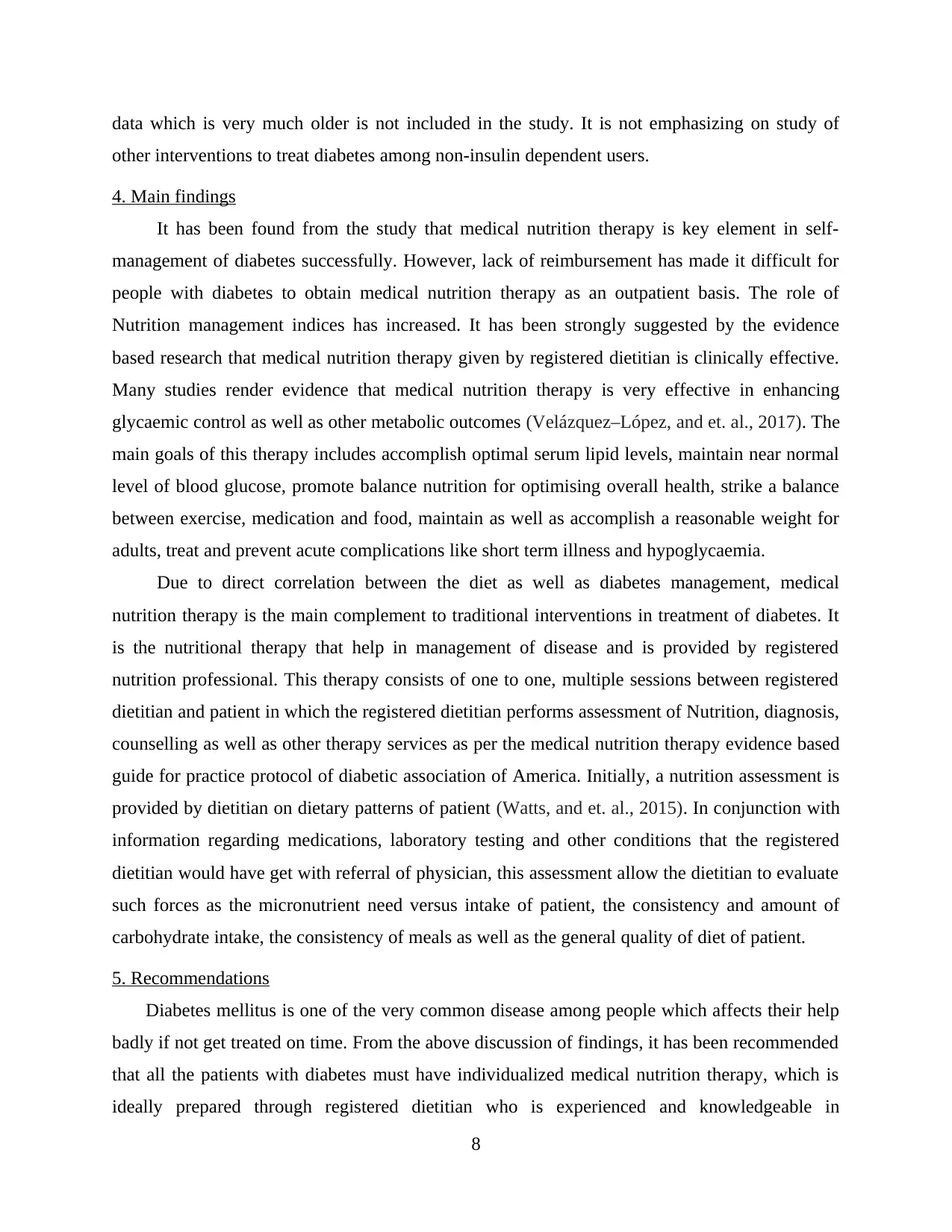
data which is very much older is not included in the study. It is not emphasizing on study of
other interventions to treat diabetes among non-insulin dependent users.
4. Main findings
It has been found from the study that medical nutrition therapy is key element in self-
management of diabetes successfully. However, lack of reimbursement has made it difficult for
people with diabetes to obtain medical nutrition therapy as an outpatient basis. The role of
Nutrition management indices has increased. It has been strongly suggested by the evidence
based research that medical nutrition therapy given by registered dietitian is clinically effective.
Many studies render evidence that medical nutrition therapy is very effective in enhancing
glycaemic control as well as other metabolic outcomes (Velázquez–López, and et. al., 2017). The
main goals of this therapy includes accomplish optimal serum lipid levels, maintain near normal
level of blood glucose, promote balance nutrition for optimising overall health, strike a balance
between exercise, medication and food, maintain as well as accomplish a reasonable weight for
adults, treat and prevent acute complications like short term illness and hypoglycaemia.
Due to direct correlation between the diet as well as diabetes management, medical
nutrition therapy is the main complement to traditional interventions in treatment of diabetes. It
is the nutritional therapy that help in management of disease and is provided by registered
nutrition professional. This therapy consists of one to one, multiple sessions between registered
dietitian and patient in which the registered dietitian performs assessment of Nutrition, diagnosis,
counselling as well as other therapy services as per the medical nutrition therapy evidence based
guide for practice protocol of diabetic association of America. Initially, a nutrition assessment is
provided by dietitian on dietary patterns of patient (Watts, and et. al., 2015). In conjunction with
information regarding medications, laboratory testing and other conditions that the registered
dietitian would have get with referral of physician, this assessment allow the dietitian to evaluate
such forces as the micronutrient need versus intake of patient, the consistency and amount of
carbohydrate intake, the consistency of meals as well as the general quality of diet of patient.
5. Recommendations
Diabetes mellitus is one of the very common disease among people which affects their help
badly if not get treated on time. From the above discussion of findings, it has been recommended
that all the patients with diabetes must have individualized medical nutrition therapy, which is
ideally prepared through registered dietitian who is experienced and knowledgeable in
8
other interventions to treat diabetes among non-insulin dependent users.
4. Main findings
It has been found from the study that medical nutrition therapy is key element in self-
management of diabetes successfully. However, lack of reimbursement has made it difficult for
people with diabetes to obtain medical nutrition therapy as an outpatient basis. The role of
Nutrition management indices has increased. It has been strongly suggested by the evidence
based research that medical nutrition therapy given by registered dietitian is clinically effective.
Many studies render evidence that medical nutrition therapy is very effective in enhancing
glycaemic control as well as other metabolic outcomes (Velázquez–López, and et. al., 2017). The
main goals of this therapy includes accomplish optimal serum lipid levels, maintain near normal
level of blood glucose, promote balance nutrition for optimising overall health, strike a balance
between exercise, medication and food, maintain as well as accomplish a reasonable weight for
adults, treat and prevent acute complications like short term illness and hypoglycaemia.
Due to direct correlation between the diet as well as diabetes management, medical
nutrition therapy is the main complement to traditional interventions in treatment of diabetes. It
is the nutritional therapy that help in management of disease and is provided by registered
nutrition professional. This therapy consists of one to one, multiple sessions between registered
dietitian and patient in which the registered dietitian performs assessment of Nutrition, diagnosis,
counselling as well as other therapy services as per the medical nutrition therapy evidence based
guide for practice protocol of diabetic association of America. Initially, a nutrition assessment is
provided by dietitian on dietary patterns of patient (Watts, and et. al., 2015). In conjunction with
information regarding medications, laboratory testing and other conditions that the registered
dietitian would have get with referral of physician, this assessment allow the dietitian to evaluate
such forces as the micronutrient need versus intake of patient, the consistency and amount of
carbohydrate intake, the consistency of meals as well as the general quality of diet of patient.
5. Recommendations
Diabetes mellitus is one of the very common disease among people which affects their help
badly if not get treated on time. From the above discussion of findings, it has been recommended
that all the patients with diabetes must have individualized medical nutrition therapy, which is
ideally prepared through registered dietitian who is experienced and knowledgeable in
8
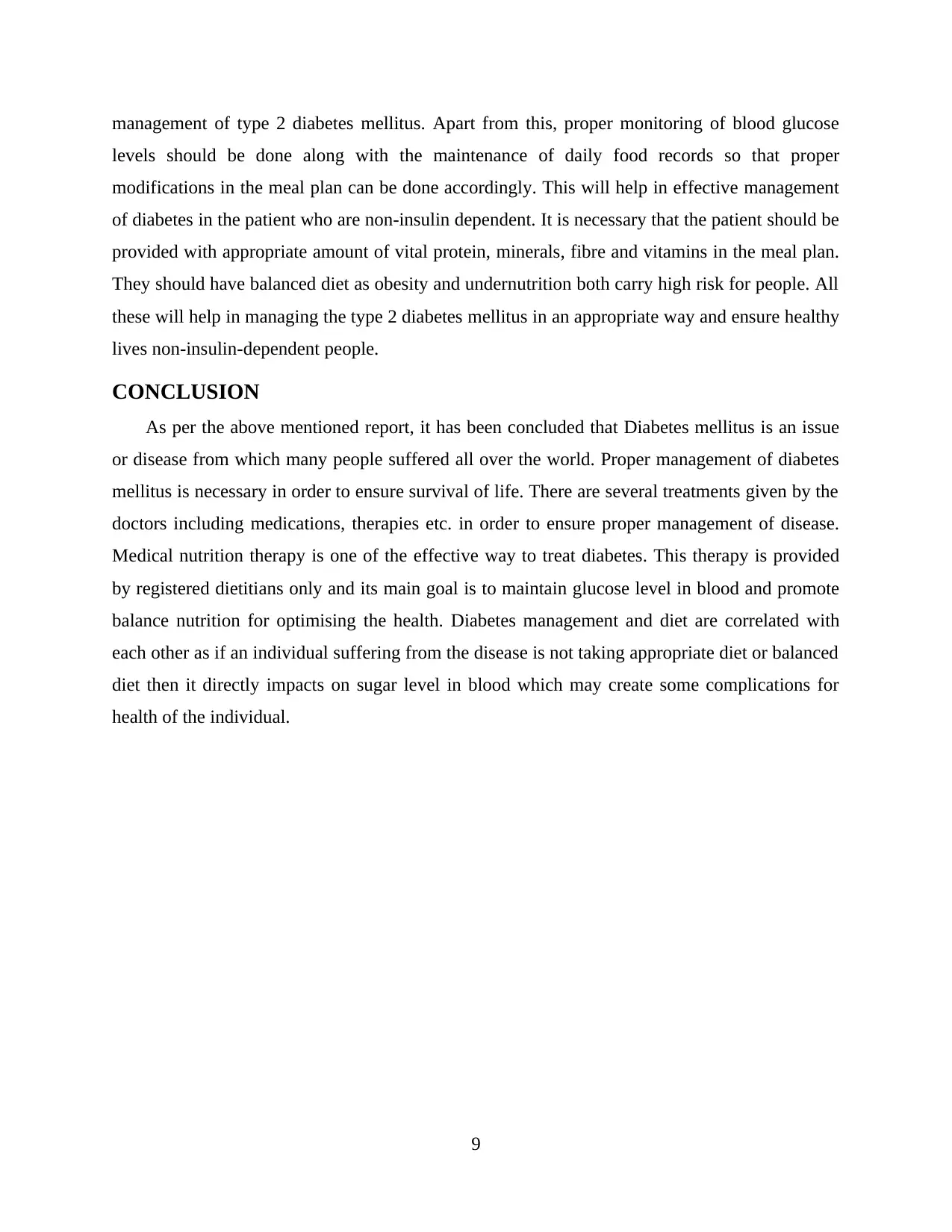
management of type 2 diabetes mellitus. Apart from this, proper monitoring of blood glucose
levels should be done along with the maintenance of daily food records so that proper
modifications in the meal plan can be done accordingly. This will help in effective management
of diabetes in the patient who are non-insulin dependent. It is necessary that the patient should be
provided with appropriate amount of vital protein, minerals, fibre and vitamins in the meal plan.
They should have balanced diet as obesity and undernutrition both carry high risk for people. All
these will help in managing the type 2 diabetes mellitus in an appropriate way and ensure healthy
lives non-insulin-dependent people.
CONCLUSION
As per the above mentioned report, it has been concluded that Diabetes mellitus is an issue
or disease from which many people suffered all over the world. Proper management of diabetes
mellitus is necessary in order to ensure survival of life. There are several treatments given by the
doctors including medications, therapies etc. in order to ensure proper management of disease.
Medical nutrition therapy is one of the effective way to treat diabetes. This therapy is provided
by registered dietitians only and its main goal is to maintain glucose level in blood and promote
balance nutrition for optimising the health. Diabetes management and diet are correlated with
each other as if an individual suffering from the disease is not taking appropriate diet or balanced
diet then it directly impacts on sugar level in blood which may create some complications for
health of the individual.
9
levels should be done along with the maintenance of daily food records so that proper
modifications in the meal plan can be done accordingly. This will help in effective management
of diabetes in the patient who are non-insulin dependent. It is necessary that the patient should be
provided with appropriate amount of vital protein, minerals, fibre and vitamins in the meal plan.
They should have balanced diet as obesity and undernutrition both carry high risk for people. All
these will help in managing the type 2 diabetes mellitus in an appropriate way and ensure healthy
lives non-insulin-dependent people.
CONCLUSION
As per the above mentioned report, it has been concluded that Diabetes mellitus is an issue
or disease from which many people suffered all over the world. Proper management of diabetes
mellitus is necessary in order to ensure survival of life. There are several treatments given by the
doctors including medications, therapies etc. in order to ensure proper management of disease.
Medical nutrition therapy is one of the effective way to treat diabetes. This therapy is provided
by registered dietitians only and its main goal is to maintain glucose level in blood and promote
balance nutrition for optimising the health. Diabetes management and diet are correlated with
each other as if an individual suffering from the disease is not taking appropriate diet or balanced
diet then it directly impacts on sugar level in blood which may create some complications for
health of the individual.
9
⊘ This is a preview!⊘
Do you want full access?
Subscribe today to unlock all pages.

Trusted by 1+ million students worldwide
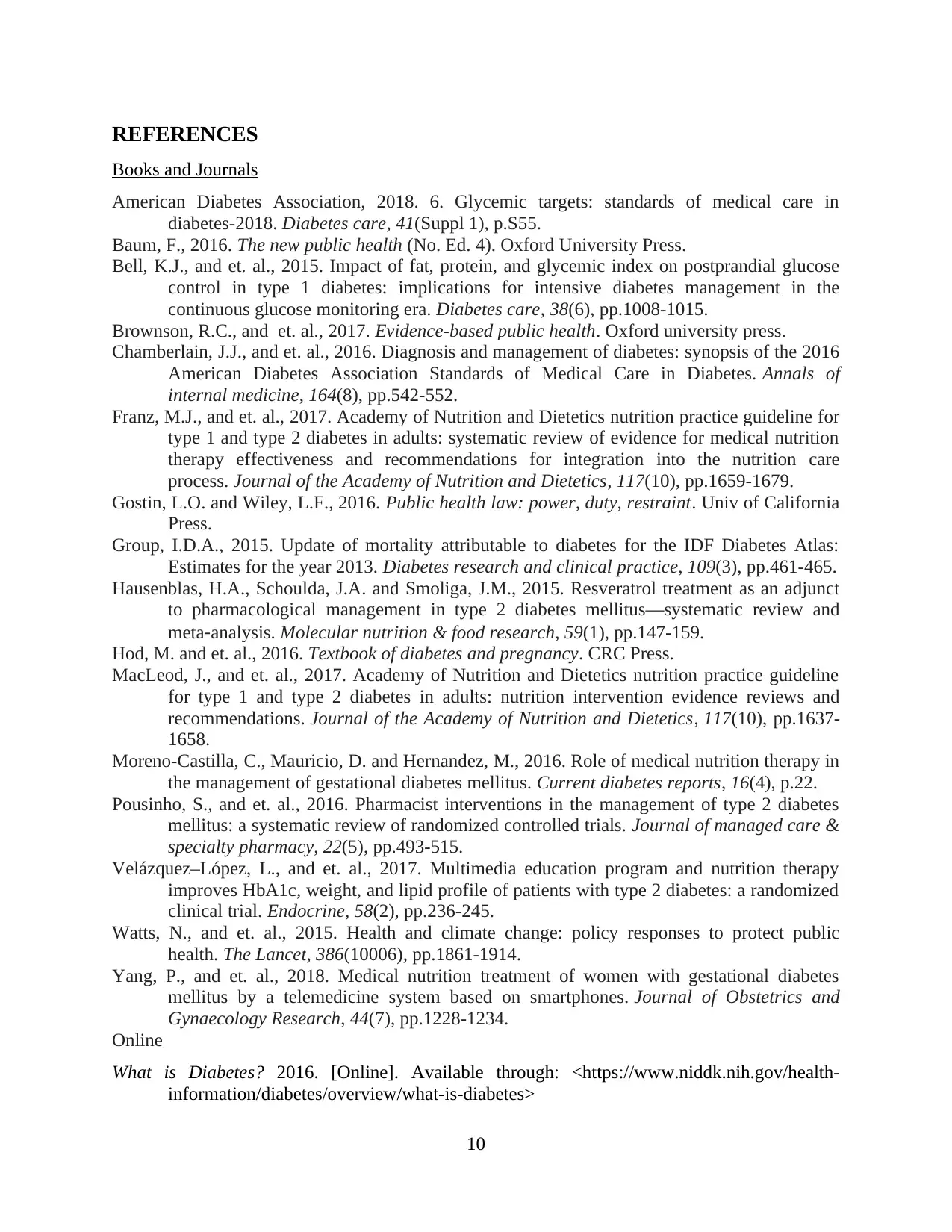
REFERENCES
Books and Journals
American Diabetes Association, 2018. 6. Glycemic targets: standards of medical care in
diabetes-2018. Diabetes care, 41(Suppl 1), p.S55.
Baum, F., 2016. The new public health (No. Ed. 4). Oxford University Press.
Bell, K.J., and et. al., 2015. Impact of fat, protein, and glycemic index on postprandial glucose
control in type 1 diabetes: implications for intensive diabetes management in the
continuous glucose monitoring era. Diabetes care, 38(6), pp.1008-1015.
Brownson, R.C., and et. al., 2017. Evidence-based public health. Oxford university press.
Chamberlain, J.J., and et. al., 2016. Diagnosis and management of diabetes: synopsis of the 2016
American Diabetes Association Standards of Medical Care in Diabetes. Annals of
internal medicine, 164(8), pp.542-552.
Franz, M.J., and et. al., 2017. Academy of Nutrition and Dietetics nutrition practice guideline for
type 1 and type 2 diabetes in adults: systematic review of evidence for medical nutrition
therapy effectiveness and recommendations for integration into the nutrition care
process. Journal of the Academy of Nutrition and Dietetics, 117(10), pp.1659-1679.
Gostin, L.O. and Wiley, L.F., 2016. Public health law: power, duty, restraint. Univ of California
Press.
Group, I.D.A., 2015. Update of mortality attributable to diabetes for the IDF Diabetes Atlas:
Estimates for the year 2013. Diabetes research and clinical practice, 109(3), pp.461-465.
Hausenblas, H.A., Schoulda, J.A. and Smoliga, J.M., 2015. Resveratrol treatment as an adjunct
to pharmacological management in type 2 diabetes mellitus—systematic review and
meta‐analysis. Molecular nutrition & food research, 59(1), pp.147-159.
Hod, M. and et. al., 2016. Textbook of diabetes and pregnancy. CRC Press.
MacLeod, J., and et. al., 2017. Academy of Nutrition and Dietetics nutrition practice guideline
for type 1 and type 2 diabetes in adults: nutrition intervention evidence reviews and
recommendations. Journal of the Academy of Nutrition and Dietetics, 117(10), pp.1637-
1658.
Moreno-Castilla, C., Mauricio, D. and Hernandez, M., 2016. Role of medical nutrition therapy in
the management of gestational diabetes mellitus. Current diabetes reports, 16(4), p.22.
Pousinho, S., and et. al., 2016. Pharmacist interventions in the management of type 2 diabetes
mellitus: a systematic review of randomized controlled trials. Journal of managed care &
specialty pharmacy, 22(5), pp.493-515.
Velázquez–López, L., and et. al., 2017. Multimedia education program and nutrition therapy
improves HbA1c, weight, and lipid profile of patients with type 2 diabetes: a randomized
clinical trial. Endocrine, 58(2), pp.236-245.
Watts, N., and et. al., 2015. Health and climate change: policy responses to protect public
health. The Lancet, 386(10006), pp.1861-1914.
Yang, P., and et. al., 2018. Medical nutrition treatment of women with gestational diabetes
mellitus by a telemedicine system based on smartphones. Journal of Obstetrics and
Gynaecology Research, 44(7), pp.1228-1234.
Online
What is Diabetes? 2016. [Online]. Available through: <https://www.niddk.nih.gov/health-
information/diabetes/overview/what-is-diabetes>
10
Books and Journals
American Diabetes Association, 2018. 6. Glycemic targets: standards of medical care in
diabetes-2018. Diabetes care, 41(Suppl 1), p.S55.
Baum, F., 2016. The new public health (No. Ed. 4). Oxford University Press.
Bell, K.J., and et. al., 2015. Impact of fat, protein, and glycemic index on postprandial glucose
control in type 1 diabetes: implications for intensive diabetes management in the
continuous glucose monitoring era. Diabetes care, 38(6), pp.1008-1015.
Brownson, R.C., and et. al., 2017. Evidence-based public health. Oxford university press.
Chamberlain, J.J., and et. al., 2016. Diagnosis and management of diabetes: synopsis of the 2016
American Diabetes Association Standards of Medical Care in Diabetes. Annals of
internal medicine, 164(8), pp.542-552.
Franz, M.J., and et. al., 2017. Academy of Nutrition and Dietetics nutrition practice guideline for
type 1 and type 2 diabetes in adults: systematic review of evidence for medical nutrition
therapy effectiveness and recommendations for integration into the nutrition care
process. Journal of the Academy of Nutrition and Dietetics, 117(10), pp.1659-1679.
Gostin, L.O. and Wiley, L.F., 2016. Public health law: power, duty, restraint. Univ of California
Press.
Group, I.D.A., 2015. Update of mortality attributable to diabetes for the IDF Diabetes Atlas:
Estimates for the year 2013. Diabetes research and clinical practice, 109(3), pp.461-465.
Hausenblas, H.A., Schoulda, J.A. and Smoliga, J.M., 2015. Resveratrol treatment as an adjunct
to pharmacological management in type 2 diabetes mellitus—systematic review and
meta‐analysis. Molecular nutrition & food research, 59(1), pp.147-159.
Hod, M. and et. al., 2016. Textbook of diabetes and pregnancy. CRC Press.
MacLeod, J., and et. al., 2017. Academy of Nutrition and Dietetics nutrition practice guideline
for type 1 and type 2 diabetes in adults: nutrition intervention evidence reviews and
recommendations. Journal of the Academy of Nutrition and Dietetics, 117(10), pp.1637-
1658.
Moreno-Castilla, C., Mauricio, D. and Hernandez, M., 2016. Role of medical nutrition therapy in
the management of gestational diabetes mellitus. Current diabetes reports, 16(4), p.22.
Pousinho, S., and et. al., 2016. Pharmacist interventions in the management of type 2 diabetes
mellitus: a systematic review of randomized controlled trials. Journal of managed care &
specialty pharmacy, 22(5), pp.493-515.
Velázquez–López, L., and et. al., 2017. Multimedia education program and nutrition therapy
improves HbA1c, weight, and lipid profile of patients with type 2 diabetes: a randomized
clinical trial. Endocrine, 58(2), pp.236-245.
Watts, N., and et. al., 2015. Health and climate change: policy responses to protect public
health. The Lancet, 386(10006), pp.1861-1914.
Yang, P., and et. al., 2018. Medical nutrition treatment of women with gestational diabetes
mellitus by a telemedicine system based on smartphones. Journal of Obstetrics and
Gynaecology Research, 44(7), pp.1228-1234.
Online
What is Diabetes? 2016. [Online]. Available through: <https://www.niddk.nih.gov/health-
information/diabetes/overview/what-is-diabetes>
10
Paraphrase This Document
Need a fresh take? Get an instant paraphrase of this document with our AI Paraphraser
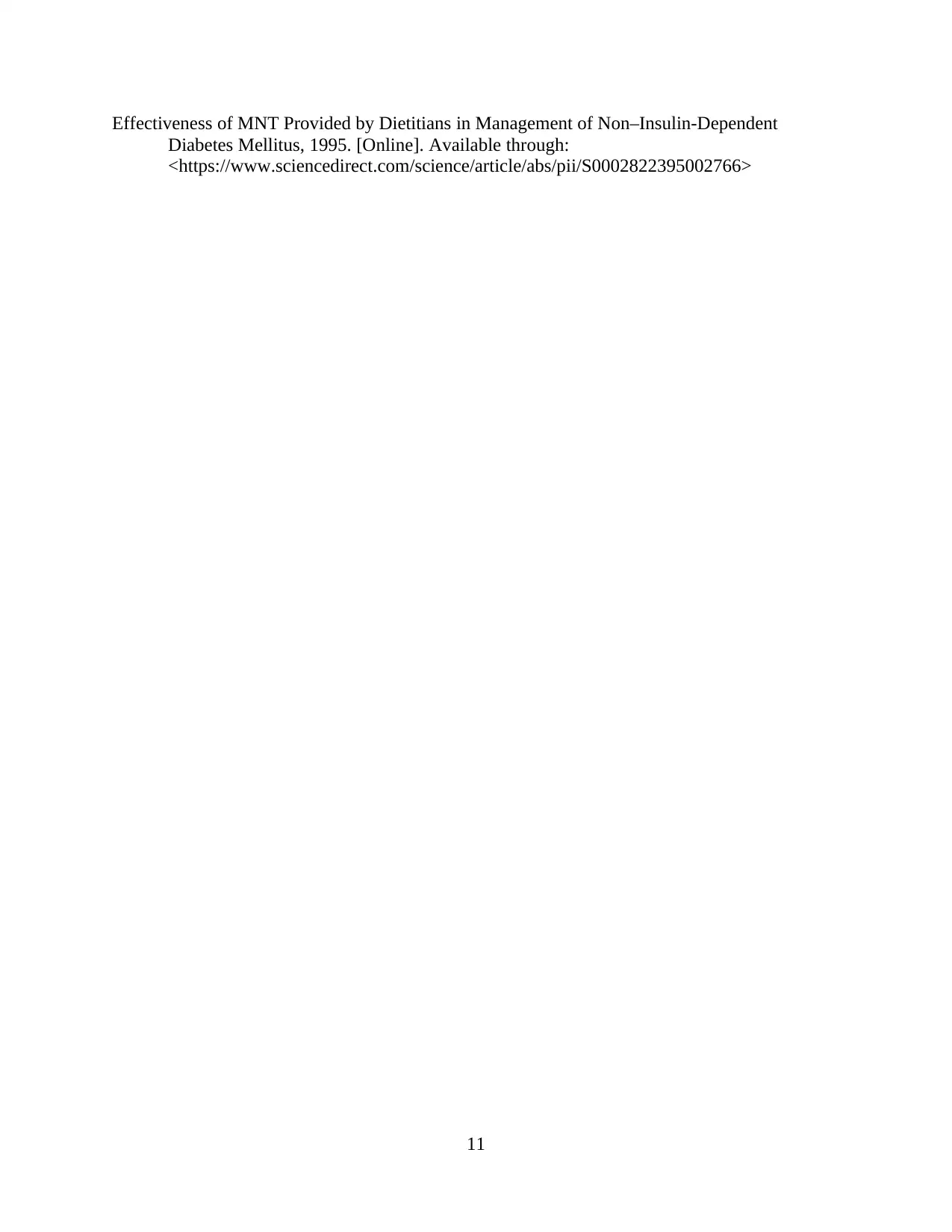
Effectiveness of MNT Provided by Dietitians in Management of Non–Insulin-Dependent
Diabetes Mellitus, 1995. [Online]. Available through:
<https://www.sciencedirect.com/science/article/abs/pii/S0002822395002766>
11
Diabetes Mellitus, 1995. [Online]. Available through:
<https://www.sciencedirect.com/science/article/abs/pii/S0002822395002766>
11
1 out of 11
Related Documents
Your All-in-One AI-Powered Toolkit for Academic Success.
+13062052269
info@desklib.com
Available 24*7 on WhatsApp / Email
![[object Object]](/_next/static/media/star-bottom.7253800d.svg)
Unlock your academic potential
Copyright © 2020–2026 A2Z Services. All Rights Reserved. Developed and managed by ZUCOL.




